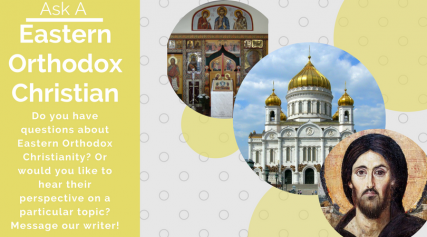What would you like to know about the Eastern Orthodox Christian faith? Submit your question.
In Baptism how is the water from baptism disposed of?
Each Orthodox Church may have a different way to dispose of this baptismal water. The content is only water and a teaspoon of oil of the sacrament of Chrismation. Traditionally the water is poured into the ground in a dry well under a church or may be disposed of at another undisturbed location.
On another note, one might want to understand the purpose of this mystical sacrament of baptism and why it is the gate that one must pass through to enter the Kingdom of God.
John 3:5 Jesus answered, “Most assuredly, I say to you unless one is born of water [full immersion] and the Spirit [born from above], he cannot enter the kingdom of God.
The sacrament of baptism was inaugurated at the baptism of Christ by Saint John the Forerunner in the Jordan River. This Feast day is called Theophany celebrated on Jan. 6, 12 days after the Nativity (Christmas). On that feast day of Theophany, the presence of the Holy Trinity was made manifest to mankind. After Jesus was baptized, He began His earthly ministry, and the primary message of our Christian faith “repent for the Kingdom of Heaven is at hand” (Mark 1:15).
Baptism is an outward sign of an inner belief, a profession of faith, the rite of passage, the dying of the worldly person, and the resurrection of a new person in a life in Christ. In the Eastern Orthodox Church, this sacramental mystery is the gate to enter the Kingdom of God (Romans 6:3-5; Colossians 2:12, 3:1-4).
The hallmark of baptism in the Eastern Orthodox tradition is full immersion. The Sacrament of Chrismation, Seal of the Holy Spirit of God, is also performed immediately following baptism with the anointing of the newly illumined with this blessed oil. The sacrament of holy communion is also received by the newly illumined at the next divine liturgy.
If a person has been baptized by a recognized Christian Church who plans to become a member of the Orthodox Church, they receive the anointing and confirmation of the Sacrament of Chrismation.
The following is the Troparion (hymn) of Theophany is sung on this feast day.
When Thou was baptized in the Jordan, O Lord, the worship of the Trinity was made manifest; for the voice of the Father bare witness to Thee, calling Thee His beloved Son. And the Spirit in the form of a dove, confirmed the certainty of the word. O Christ our God, Who hast appeared and hast enlightened the world, glory be to Thee. (Matt. 3:13 17; Mark 1:9 11; Luke 3:1 22).










